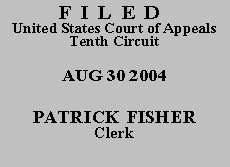

| HENRY F. BUTLER,
Plaintiff-Appellant, v. THE BOEING COMPANY, Defendant-Appellee. |
|
Plaintiff-appellant Henry Butler, proceeding pro se, appeals the district court's grant of summary judgment to defendant-appellee The Boeing Company, and the denial of his motion to alter or amend that judgment under Fed. R. Civ. P. 59(e). Plaintiff had alleged employment discrimination in violation of the Civil Rights Act of 1866, 42 U.S.C. § 1981. On appeal, he reargues facts presented to the district court, and he contends that the termination of discovery deprived him of due process under the law. Aplt. Br. at 2-3, 11-20. We exercise jurisdiction pursuant to 42 U.S.C. § 1291, and we affirm.
On December 17, 2002, the district court granted defendant summary judgment because plaintiff had "not shown that [defendant's actions] were pervasive or severe enough to alter the terms, conditions or privileges of his employment . . . . Moreover, plaintiff [had] not shown that the alleged conduct was based on race." Butler v. Boeing Co., No. 01-2433-KHV, slip op. at 12 (D. Kan. Dec. 17, 2002). On January 1, 2003, plaintiff personally filed a motion to alter or amend judgment under Rule 59(e), purporting to sign on behalf of his attorney. On January 10, 2003, plaintiff's attorney filed a signed motion, substantially complying with the district court's order to cure this deficiency. We thus treat the motion to alter or amend as having been filed on January 1, 2003.
We review a district court's grant of summary judgment de novo, applying the same legal standard used by the district court. Simms v. Okla. ex rel. Dep't of Mental Health and Substance Abuse Servs., 165 F.3d 1321, 1326 (10th Cir. 1999). Summary judgment is appropriate "if the pleadings, depositions, answers to interrogatories, and admissions on file, together with the affidavits, if any, show that there is no genuine issue as to any material fact and that the moving party is entitled to a judgment as a matter of law." Fed. R. Civ. P. 56(c). When applying this standard, we view the evidence and draw reasonable inferences therefrom in the light most favorable to the nonmoving party. Byers v. City of Albuquerque, 150 F.3d 1271, 1274 (10th Cir. 1998).
After thorough review of the record, we agree that plaintiff failed to show that his perceived injuries on the job were pervasive or severe enough to alter the terms, conditions or privileges of his employment. Butler, No. 01-2433-KHV, slip op. at 12; Bolden v. PRC Inc., 43 F.3d 545, 551 (10th Cir. 1994). Moreover, plaintiff failed to tie his perceived injuries to race. Butler, No. 01-2433-KHV, slip op. at 12; Trujillo v. Univ. of Colo. Health Sciences Ctr., 157 F.3d 1211, 1214-15 (10th Cir. 1998). Plaintiff recites a litany of slights and insults that are not necessarily connected, nor do they seem particularly directed at him or his employment. For example, although plaintiff is an African-American man, in noting that other people promoted were Caucasian, he fails to take into account their individual merit, experience, and relative qualifications for the jobs to which they were promoted. "[N]ot every insult, slight, or unpleasantness gives rise" to a valid employment discrimination claim. Robinson v. City of Pittsburgh, 120 F.3d 1286, 1297 (3d Cir. 1997); Meritor Sav. Bank, FSB v. Vinson, 477 U.S. 57, 67 (1986). We conclude that grant of summary judgment for defendant was appropriate.
Generally, if a plaintiff files his motion to alter or amend a judgment under Rule 59(e) within ten days of the district court's entry of judgment, we review the district court's decision not to grant the motion for abuse of discretion. Adams v. Reliance Standard Life Ins. Co., 225 F.3d 1179, 1186 n.5 (10th Cir. 2000). We find no abuse of discretion and affirm the district court's denial of the motion.
Finally, we review district court decisions regarding discovery for abuse of discretion. GWN Petroleum Corp. v. OK-Tex Oil & Gas, Inc., 998 F.2d 853, 858 (10th Cir. 1993). Discovery in this case closed with the entry of a pretrial conference order on August 7, 2002. Plaintiff moved to reopen discovery on September 24, 2002, nearly a month and a half after the scheduled close of discovery, and nearly a month after defendant had filed for summary judgment. His motion also failed to show that additional discovery was likely to lead to relevant evidence. We hold that the district court did not abuse its discretion in denying plaintiff's motion to reopen discovery as inappropriate.
We AFFIRM the judgment of the district court for substantially the reasons stated. All other motions are DENIED as moot.
Entered for the Court
Circuit Judge
*. This order and judgment is not binding precedent, except under the doctrines of law of the case, res judicata, and collateral estoppel. The court generally disfavors the citation of orders and judgments; nevertheless, an order and judgment may be cited under the terms and conditions of 10th Cir. R. 36.3.